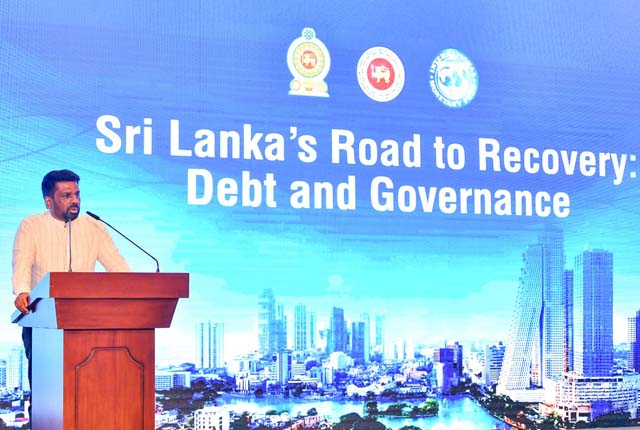President Anura Kumara Disanayake, delivering the keynote address at the international conference “Sri Lanka’s Road to Recovery: Debt and Governance” in Colombo today (16), declared that by 2028 Sri Lanka will have laid the foundation for a stable and self-reliant economy, one capable of independently meeting its external debt obligations. Emphasizing that true sovereignty cannot exist amidst economic collapse, he asserted, “Our ultimate goal is to restore national sovereignty through economic stability and self-reliance.” He urged public officials and citizens alike to contribute to this national endeavour, stressing that the ongoing reform process demands a collective and sustained effort.
The conference, a landmark event jointly hosted by the Ministry of Finance, the Central Bank of Sri Lanka and the International Monetary Fund (IMF), drew global attention as it examined the country’s recovery from economic crisis, the progress of debt restructuring and future challenges under the IMF’s Extended Fund Facility (EFF) programme.
The President acknowledged that while a degree of macroeconomic stability has been restored, Sri Lanka must not be lulled into complacency. “Surface-level stability is not enough,” he stated. “We must deepen this stability through structural reforms that reshape the foundations of our economy.” He also noted several achievements of the current administration within a relatively short timeframe, expressing confidence in continuing this trajectory towards lasting political, economic and social stability.
This conference was held to reflect on Sri Lanka’s experiences, lessons learned and progress made during the debt restructuring process, as well as to discuss the progress and upcoming challenges related to the Extended Fund Facility programme with the International Monetary Fund.
Central Bank Governor Dr. Nandalal Weerasinghe echoed these sentiments, crediting the IMF and international partners for their support in Sri Lanka’s turnaround from a historic crisis that culminated in a sovereign default in 2022. Recalling the severity of the crisis, marked by hyperinflation, shortages and institutional erosion, Dr. Weerasinghe attributed the collapse to years of fiscal mismanagement and unchecked vulnerabilities.
“Stabilization was just the first step,” he noted. “The real test lies in sustaining growth through structural change.”
He highlighted the progress made under the EFF programme, including: Taming inflation – now back to single digits; Rebuilding external balances – including rare current account surpluses and reserve growth; Improving fiscal discipline – with narrowing deficits and emerging primary surpluses.
Dr. Weerasinghe further underlined the importance of governance reforms, pointing to new legislation such as the Central Bank Act, the Public Financial Management Act and the Anti-Corruption Act as pillars of long-term institutional credibility.
Urging stakeholders to maintain policy consistency, empower the private sector and protect the vulnerable, he emphasized: “Sri Lanka’s transformation must be domestically driven, with strong institutions and united public commitment.”
Delivering a pivotal message, IMF First Deputy Managing Director Dr. Gita Gopinath commended Sri Lanka’s hard-won gains but reminded attendees of the cost borne by the people, particularly the most vulnerable.
“The key lesson from this crisis is that it must never happen again,” she said, stressing the need for continued reforms targeting structural weaknesses such as unsustainable subsidies and inefficient pricing mechanisms. Though socially painful, she insisted such changes are essential for resilience.
She also cautioned against “reform fatigue,” highlighting that half of Sri Lanka’s 16 past IMF programmes faltered due to reversals. “This time must be different,” Dr. Gopinath urged. “Success should be measured not just by numbers but by whether this becomes Sri Lanka’s last IMF programme.” She called for inclusive governance, civil society engagement and equitable policymaking that reaches beyond Colombo, reaffirming the IMF’s commitment while urging national ownership of the recovery path.














